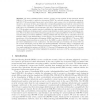Free Online Productivity Tools
i2Speak
i2Symbol
i2OCR
iTex2Img
iWeb2Print
iWeb2Shot
i2Type
iPdf2Split
iPdf2Merge
i2Bopomofo
i2Arabic
i2Style
i2Image
i2PDF
iLatex2Rtf
Sci2ools
PKC
2015
Springer
2015
Springer
Simulation-Based Selective Opening CCA Security for PKE from Key Encapsulation Mechanisms
We study simulation-based, selective opening security against chosen-ciphertext attacks (SIM-SO-CCA security) for public key encryption (PKE). In a selective opening, chosen-ciphertext attack (SO-CCA), an adversary has access to a decryption oracle, sees a vector of ciphertexts, adaptively chooses to open some of them, and obtains the corresponding plaintexts and random coins used in the creation of the ciphertexts. The SIM-SO-CCA notion captures the security of unopened ciphertexts with respect to probabilistic polynomial-time (ppt) SO-CCA adversaries in a semantic way: what a ppt SO-CCA adversary can compute can also be simulated by a ppt simulator with access only to the opened messages. Building on techniques used to achieve weak deniable encryption and non-committing encryption, Fehr et al. (Eurocrypt 2010) presented an approach to constructing SIM-SO-CCA secure PKE from extended hash proof systems (EHPSs), collision-resistant hash functions and an information-theoretic primitive ...
Cryptology | PKC 2015 |
| Added | 16 Apr 2016 |
| Updated | 16 Apr 2016 |
| Type | Journal |
| Year | 2015 |
| Where | PKC |
| Authors | Shengli Liu, Kenneth G. Paterson |
Comments (0)

